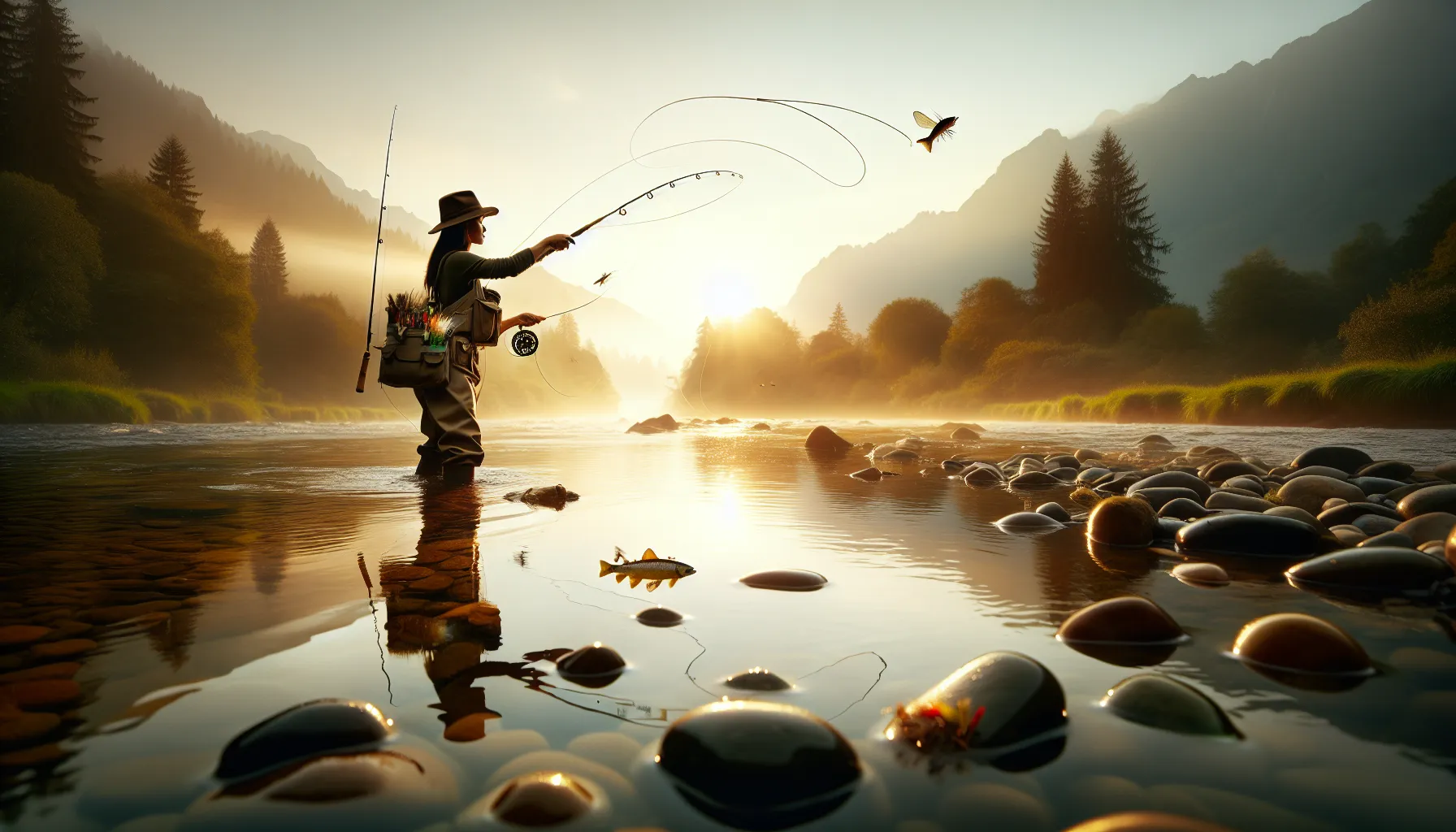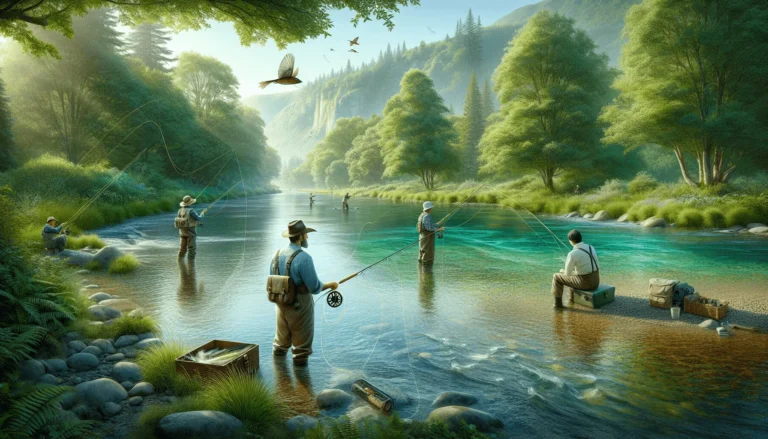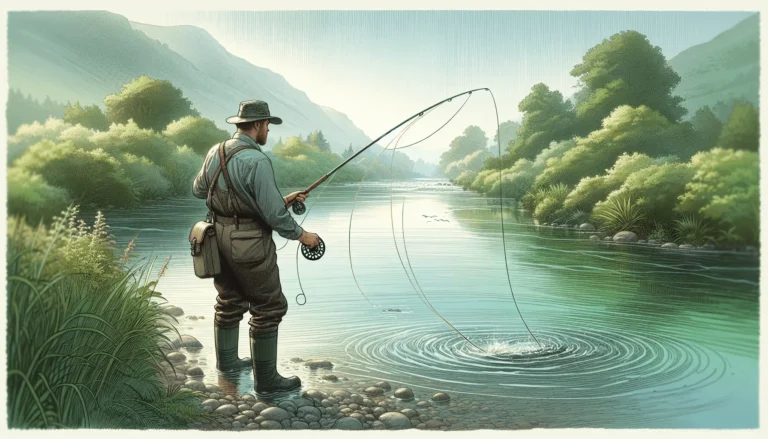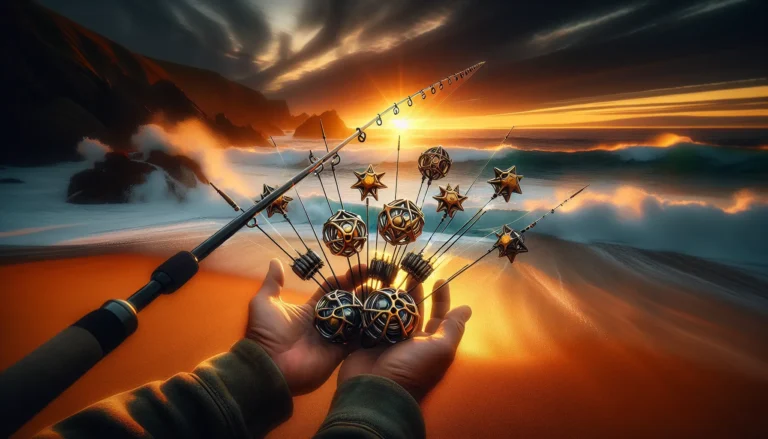Fly fishing has long captivated anglers with its unique blend of art and sport. Many wonder, “Is fly fishing hard to master?” This question often surfaces on platforms like Reddit, where enthusiasts debate the challenges and rewards of this classic technique. While some argue that fly fishing is harder than traditional methods, others find it to be a more engaging and satisfying way to catch fish.
The journey to become proficient in fly fishing involves several key aspects. Anglers must acquire essential gear, develop crucial fly fishing skills, and overcome common obstacles that beginners face. This article explores these elements, offering expert insights on why some struggle to catch fish while fly fishing and how to improve rapidly. By understanding these factors, novice anglers can better prepare themselves to tackle the learning curve and enjoy the many benefits this captivating sport has to offer.
Essential Gear for Fly Fishing Success
Choosing the Right Rod and Reel
Selecting the appropriate fly fishing combo is crucial for beginners. A good starter set should allow anglers to learn, challenge themselves, and work in various settings as they explore their preferences on the water . The basic components of a fly fishing combo include a rod, fly line, and a reel for the line .
For beginners, it’s recommended to focus on rods within the 9′, 4-5wt range with medium/fast action . This setup suits a wide range of angling situations. The weight of a rod indicates the size of fish and water conditions it can handle, while the action refers to the rod’s flexibility and bend during casting .
Many quality combos come pre-spooled with backing and fly line, and some include a rod tube for travel and storage . Prices for decent fly rod and reel combos typically start around $200, with options to upgrade as skills progress .
Read Also: Top 15 Best Gifts for Fly Fisherman in 2024
Understanding Fly Lines and Leaders
Fly lines are crucial for effective casting and presentation. Weight-forward, floating lines are recommended for beginners, as they’re well-suited for today’s faster rods and cover a wide range of fishing scenarios . The line weight should match the rod weight for optimal performance .
Leaders connect the fly line to the fly, providing a more subtle presentation. Beginners should start with pre-made leaders, typically 9 feet in length, with varying tensile strengths . Tippet material is used to extend or repair leaders and comes in different strengths, denoted by “X” ratings .
Selecting Appropriate Flies
Choosing the right flies involves considering factors such as size, movement, shape, and color to match the natural food sources in the water . When fish aren’t actively feeding, attractor patterns like the Wooly Bugger can be effective, as they suggest something tasty without mimicking a specific food source .
For beginners, it’s essential to have a variety of flies that can be used in different situations. The key is to observe the water, match imitations to visible feeding activity, and use attractors when no obvious food source is present . Most importantly, choose flies that inspire confidence, as this will translate to more focused and effective fishing .
Developing Crucial Fly Fishing Skills
Perfecting Your Cast
Fly casting is a fundamental skill in fly fishing. The loop, which is the shape the line takes while unrolling off the rod tip, directly affects cast performance and how the line lands on the water. To improve casting, anglers should focus on the path of the rod tip, as it largely determines loop size and shape. A relatively straight rod tip path creates a tighter, narrow loop, while an arcing path creates a wider loop .
To achieve tighter loops, anglers can use the haul technique, which relies more on the line hand and prevents overpowering the rod tip. Switching grips can also influence loop control. Placing the thumb on top of the grip creates wider loops, while the finger-on-top method naturally locks the wrist, preventing it from opening too much during the casting stroke .
Learning to ‘Read’ the Water
Reading the water is crucial for successful fly fishing. Fish are typically found in only about 10% of a water mass, seeking either shelter from predators or food sources. Anglers should look for three key spots: shelter/nesting areas, feeding lanes, and holding grounds .
Seams, formed when water hits a rock or object disrupting the current, are optimal locations for trout. These areas create slower streams where fish can find shelter and food without expending too much energy. Anglers can position themselves at various seams, such as rock seams, river bend seams, and pool heads and tails, to increase their chances of success .
Mastering Knot Tying
Knot tying is a foundational skill in fly fishing, connecting the various components of the fly line system. The tippet serves two purposes: it allows for frequent fly changes without shortening the leader and adds slack for drag-free presentations. Common knots include the blood knot and surgeon’s knot for connecting monofilament pieces, and the Pitzen knot for attaching flies .
For heavy tippets, the no-slip loop knot is popular as it allows for maximum fly movement in the water. Mastering these knots is essential for creating a reliable and effective fly fishing setup .
Common Obstacles for Beginners
Tangled Lines and Snags
Fly fishing beginners often face the frustration of tangled lines and snags. These issues can infuriate even the calmest angler, sometimes leading to fits of anger or humiliating attempts to free the line. Not all snags are created equal; rocks are generally easier to deal with than logs or wood, where hooks can become deeply embedded. The location of the snag, water depth, current strength, and the angler’s position all play a role in determining the chances of freeing the hook .
Difficulty in Spotting Fish
Spotting fish is a crucial skill in fly fishing, especially in places like New Zealand where sight fishing is prevalent. However, many novice anglers struggle to see all but the most obvious fish. Trout are not evenly distributed in a river, preferring certain features and places. Anglers need to learn to identify prime trout real estate, looking for current lines and shears where fast and slow water meet .
Frustration with Initial Results
Beginners often experience frustration with their initial results. The sport has a steep learning curve, and it can take a long time to catch the first fish. This frustration can lead to self-criticism and disappointment, often manifested in “should” statements like “I should be catching more fish” or “I should have a longer cast” . It’s important for beginners to practice patience and persistence, remembering that improvement comes with time and experience.
Expert Advice for Rapid Improvement
Finding a Mentor or Guide
For rapid improvement in fly fishing, finding a mentor or guide is crucial. An experienced guide can provide tailored feedback, point out areas for improvement, and help develop an effective practice routine . Fly shop owners and their associates can be valuable sources of learning . Hiring a guide for a day can lead to remarkable progress in fly fishing skills, and using the same guide once or twice a year can accelerate improvement . Some anglers have found that taking a fly-tying class significantly enhanced their overall fly fishing skills .
Practicing in Various Conditions
To enhance skills quickly, it’s essential to practice in a variety of conditions. This approach helps anglers become more adaptable and able to perform well in different circumstances . Experienced anglers recommend being flexible and adjusting techniques based on changing water levels, temperatures, and fish behavior . For instance, dropping water levels may require anglers to locate fish in different spots compared to the previous day .
Analyzing and Learning from Each Outing
After each fishing session, it’s important to analyze what went well and what could be improved. This reflective process allows anglers to identify specific areas to focus on going forward . Observing and understanding fish behavior, such as where trout feed in the water column, can lead to valuable insights and improved success rates . Additionally, being open to trying new techniques or flies, like emerger patterns, can significantly enhance an angler’s ability to catch fish in challenging situations .
Conclusion
Fly fishing, while challenging, offers a rewarding experience for those willing to put in the effort. The journey to master this art involves acquiring the right gear, honing essential skills, and overcoming common hurdles. By focusing on these key areas and seeking guidance from experienced anglers, beginners can speed up their progress and enjoy the sport more fully. What’s more, the process of learning to read water, perfect casting techniques, and select appropriate flies has an impact on not just fishing success, but also on one’s connection with nature.
In the end, the question “Is fly fishing hard to master?” doesn’t have a simple answer. It depends on the individual’s dedication, patience, and willingness to learn. While the initial learning curve might be steep, the rewards of perseverance are significant. As anglers develop their skills and gain experience, they often find that fly fishing becomes not just a hobby, but a lifelong passion. So, for those intrigued by the art of fly fishing, the journey to mastery is well worth embarking upon.
FAQs
1. How challenging is it to start learning fly fishing?
Fly fishing is not as daunting as it may seem. While it involves more complexities compared to traditional fishing, mastering the basics such as casting, fly selection, and presentation can simplify the process. The roll cast is recommended for beginners.
2. Does fly fishing require more skill than traditional fishing?
Fly fishing, often practiced in both still and flowing waters, particularly rivers, is indeed a more intricate form of fishing and may take longer to learn than traditional fishing. However, the effort is rewarding, and once you get the hang of it, it becomes an addictive sport.
3. Is fly fishing a suitable activity for beginners?
Absolutely, beginners can find great joy in fly fishing. Starting with a basic fly fishing kit and some lessons, newcomers can quickly find the sport rewarding and enjoyable, often achieving successful catches early on.
4. Is there a perception of elitism in fly fishing?
While some newcomers might perceive fly fishing as an elitist sport, this is largely a misconception. Beginners should feel comfortable engaging in fly fishing alongside more seasoned anglers, without concern over judgment regarding their gear or experience level.




